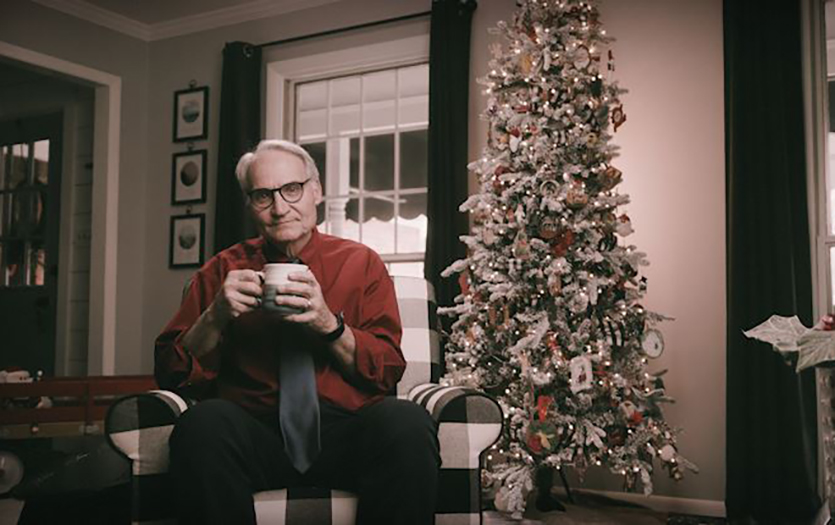
Enjoy this monthly post on stress and mindfulness from Dave Johnson, PhD, CNS, BC, LMFT, employee assistance specialist.
It seems not that long ago, but it has been many years. On December 20, 1984, my wife Rosie and I were at home with our nearly 5-year-old little boy Justin when we said our earthly goodbyes. Our other children were at a Christmas concert with a neighbor and we were alone with him on the couch in our family room.
Justin had been diagnosed with a Hepatoblastoma (liver cancer) earlier that fall. When surgery and chemotherapy failed at the medical center, we were sent home to make him as comfortable as we could. Hospice and Erin’s House were not resources in Fort Wayne at that time, but our pediatrician, his wife, our social worker, and a village of family and friends enveloped us with support and love.
That final evening of Justin’s life, as we held him, we noticed his breathing changed, slowed, and eventually stopped. His face changed from his diseased state to complete calm and peace. We cried. We hadn’t seen this calm of expression for a few months during his illness. But there he was again. We could clearly see our little boy’s face. We held him close and loved on him the only way we knew how: We did life review. We marveled at his hands and recounted the joys he used them for during his short life; five-finger turkeys, rock holding, swinging, climbing trees, riding his bike, clapping with joy and making Christmas ornaments. His hands were strong, big boy, five-year-old hands. We bathed Justin and prepared to take him to the funeral home. Before we left, there was a knock at the door. It was a group of Christmas carolers. Initially, they were a bit reluctant to sing. But they did bless us with one song on that holy December evening. They sang Silent Night.
We drove Justin to the funeral home, and entrusted his small body to the good people who work there, including my brother-in-law. We were scared to leave. It was a silent night going home without him. It was a silent night crawling into bed together without Justin between us, where he had slept the last few months of his life.
Silent Night would play at his funeral mass on Christmas Eve. The church was filled with poinsettias and balloons. Days rolled into months, then years. More children came, then grandchildren, more life chapters. We never forgot the silent night of Justin’s death, nor the music of joy that rang through Justin’s life. We felt, and feel, complete gratitude and peace.
Mindfulness during grief can be helpful to those of us who grieve and to those of us who support others. Holidays can be a bit more challenging with the sights and sounds of joy when we feel sadness and despair. I don’t pretend to have any answers. Pain and grief are raw, ruthless, and seemingly relentless. But here are a few of my thoughts about being mindful this holiday season.
Notice feelings and thoughts. Early grief (the first year) brings a stampede of emotions and confusion. Recognize and differentiate anger, sadness, confusion, depression, guilt, remorse, etc. and the multitude of thinking about our loss. Events, sights, sounds and smells can trigger strong reactions. Recognize the flood is normal and observe where and how the pain is triggered, accepting that it will come and go. Anticipate the visit of grief most hours on most days for a period of time.
Have hope. Because grief is universal and unique we know that we will have joy again. Like the weather, the storm of emotions will calm just a bit. The period between immobilizing pain and calm will change and joy will happen, all in time. Sounds cliché, but true.
Plan ahead and get support. Call a friend, minister, family member, counselor, support group and be intentional. If you need someone to listen, tell them to listen. Often we just need to know we are not alone. Having someone to be with us during the holidays can be helpful. But also notice when you really do need to be alone. Recognize your need but don’t go it alone. Think about what might be the most challenging during the holidays and make a list of what you can do or others can do to help you.
Tell the story and be OK to set the story aside. Telling your story in writing or to a listening ear can be very cathartic. Give yourself permission to feel the pain with your story but also permission to set it aside. Coming to your physical senses (what you are seeing, hearing, touching, tasting, smelling), in real time, brings us out of our thinking and overthinking brain and engages us in the present moment. This can be a moment of respite from the grief. This is tricky to do in early grief. Sometimes noticing the warmth of peppermint tea, reading a book, doing a puzzle, watching the flame of a burning fire or birds at the feeder with curiosity is not diversion from the pain, but immersion into the now. You can come back to the story often but also recognize how to shift to the present moment.
Release. Like physical pain, the emotional pain of grief takes our breath away. Notice the physical aches and pains as normal manifestations of deep loss. There are moments when one lives in autopilot during the early days and months of grief. Give yourself permission to experience whatever we feel and bring awareness to this unfolding of the chapter. Sometimes there is a natural tendency to pull away from others and wall off our pain with attempts to avoid feelings. If we don’t take the time to intentionally notice our patterns, we may experience the feeling of being stuck. Find a safe space(s) for expressing emotions such as a warm shower, outdoor walks, going to the cemetery, sitting in chapels or sacred spaces, talking with family, friends, priest, minister, or a counselor, writing a poem, planting a memory tree, etc. Cry, scream, cuss, release, jog, journal, talk, sing, pray, heal.
Explore other respites. Eat well (come to physical senses of what food looks likes, smells like, tastes like, etc.) sleep well (easier said than done), exercise (even briefly), stretch, breathe intentionally, and go on nature walks. Have sensory awareness of the changing seasons and triggers that come with impending holidays. Remind yourself to go through all your senses when outside in nature. Stop to feel the breeze, notice the sunlight, connect to the changing colors and textures of the season in real time.
For caregivers, listen … listen mindfully. Sometimes caregivers may be tempted to use cliché to instill hope. With intention and pause, look into the eyes and notice the deep pain of grief and sense what is really needed. Allow the quickening of emotion within oneself as a caregiver to be shared with the person who is being listened to. It is OK to not have easy words or advice to share. Often simple presence to partner the journey is what is needed. Be comfortable with long periods of silence or flooding of emotion. Be calm and confident that your goodness and compassion of spirit will help to anchor the soul.
Silent night
Holy night,
All is calm,
All is bright
… Sleep in heavenly peace.
… Sleep in heavenly peace.
Try a guided meditation with Dr. Johnson.
Find a relaxing space and follow along as he leads you through a brief mindfulness practice*.
Mindfulness-based stress reduction practice has been extensively researched and proven helpful for coping with changes, grief, healthy eating patterns, pain, anxiety, depression and many other chronic disease and autoimmune disorders. For more on stress management programs or 1:1 stress coaching with Dr. Dave contact the Parkview Center for Healthy Living at (260) 672-6500. He also provides on-site guidance for teambuilding, emotional intelligence, transformational leadership, among other topics. To learn more about Employees Assistance Programs for your company, call Business Development at (260) 373-9013.
*Dr. Johnson cautions anyone practicing this meditation to avoid doing so while driving or doing any other activity that requires your absolute concentration.
RESOURCES:
Facebook: Invisible Inklings
Twitter: @davejohnson2
Books: "How I will get through the holidays" by James E. Miller
"The Bereaved Parent" by Harriett Schiff
Other resources:
Dr. Dave’s TEDx video:



